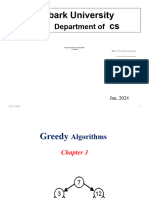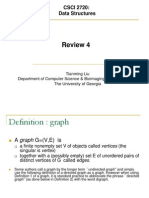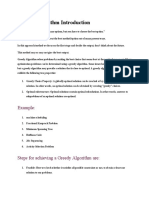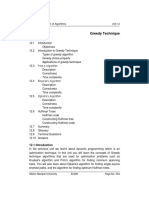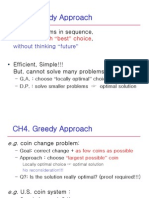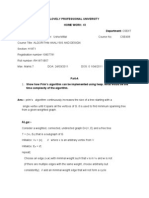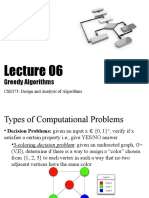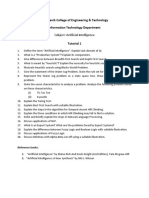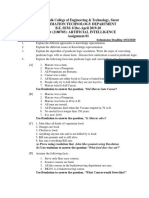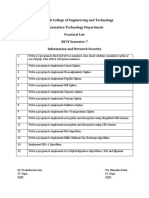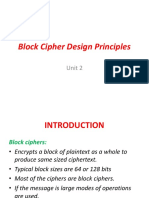0% found this document useful (0 votes)
113 views2 pagesGreedy Algorithms
This document discusses several greedy algorithms:
1) The knapsack problem algorithm uses a greedy approach of selecting the most valuable remaining item that fits in the knapsack until it is full.
2) The activity selection algorithm greedily selects non-conflicting activities based on their start and finish times to maximize the number selected.
3) Dijkstra's algorithm finds the shortest path from a source node to all other nodes in a graph by greedily selecting the neighbor with the lowest distance.
4) Kruskal's algorithm builds a minimum spanning tree by greedily selecting the shortest edge that does not create a cycle.
5) Prim's algorithm also builds a minimum spanning tree but does so
Uploaded by
palakCopyright
© © All Rights Reserved
We take content rights seriously. If you suspect this is your content, claim it here.
Available Formats
Download as PDF, TXT or read online on Scribd
0% found this document useful (0 votes)
113 views2 pagesGreedy Algorithms
This document discusses several greedy algorithms:
1) The knapsack problem algorithm uses a greedy approach of selecting the most valuable remaining item that fits in the knapsack until it is full.
2) The activity selection algorithm greedily selects non-conflicting activities based on their start and finish times to maximize the number selected.
3) Dijkstra's algorithm finds the shortest path from a source node to all other nodes in a graph by greedily selecting the neighbor with the lowest distance.
4) Kruskal's algorithm builds a minimum spanning tree by greedily selecting the shortest edge that does not create a cycle.
5) Prim's algorithm also builds a minimum spanning tree but does so
Uploaded by
palakCopyright
© © All Rights Reserved
We take content rights seriously. If you suspect this is your content, claim it here.
Available Formats
Download as PDF, TXT or read online on Scribd
/ 2



